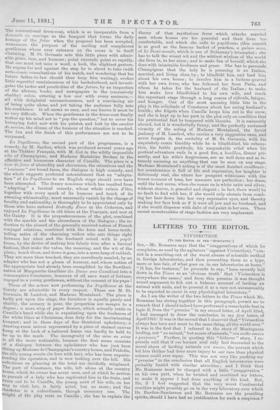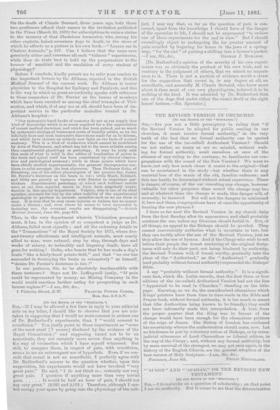LETTERS TO THE EDITOR.
VIVISECTION.
[To THE EDITOR OP Tall "SPECTATOR.") STE,—Mr. Romanes says that the "exaggerations of which he complains, as used by the agitators" (against Vivisection), " con- sist in a searching-out of the worst abuses of scientific method in foreign laboratories, and then presenting them as a type, more or less fair, of what goes on in our laboratories at home." " It has, for instance," he proceeds to say, "been recently laid down in the Times as an `obvious truth' that Vivisection is everywhere the same ;' and from this premiss it was thought sound argument to fish out a hideous account of larding an animal with nails, and to present it as a case not unreasonably to be expected to occur in any physiological laboratory."
As I am the writer of the two letters in the Times which Mr. Romanes has strung together in this paragraph, permit me to remark that I should indeed have performed a remarkable feat in logic if, from the " premiss " in my second letter, of April 22nd, I bad managed to draw the conclusion in my first letter, of April 18th ! It was in the second that I observed that " Vivisection always has been and must be the same thing, all the world over." It was in the first that I referred to the story of Mantegazza larding, not " an animal," but scores of animals, " con molto amore e pazienza." Further, in quoting this " hideous " story, I ex- pressly said that if one human soul only had descended to the moral abyss of larding animals con amore, the pursuit which led him thither had done more injury to our race than physical science could ever repay. This was not very like pushing my " premiss " to the conclusion that all English laboratories were probably busied with similar atrocities ; and I think that Mr. Romanes must be charged with a little " exaggeration " on his own part, when he twisted and combined my letters, to make it appear I had done anything of the kind. But, Sir, if I had suggested that the very worst Continental cruelties might possibly go on in the very laboratory over which Dr. Burdon-Sanderson and Mr. Romanes are the presiding spirits, should I have had no justification for such a suspicion On the death of Claude Bernard, three years ago, both these two gentlemen affixed their names to the invitation published in the Pintos (March 20, 1878) for subscriptions to raise a statue to the memory of that illustrious tormentor, who, among his
other exploits, baked seventeen dogs to death, in the stove of which he affords us a picture in his own book,—" Lecons sur la Chaleur Animale," p. 347. Can I believe that the same men genuinely abhor and renounce all such "hideous " experiments, while they do their best to hold up the perpetrators to the honour of mankind and the emulation of every student of physiology ?
Before I conclude, kindly permit mo to refer your readers to the important lecture by Dr. Althaus, reported iu the British Medical Journal of the current week. Dr. Althaus is 'senior physician to the Hospital for Epilepsy and Paralysis, and this is the way in which so great an authority speaks with reference to those researches of Dr. Ferrier on the brains of monkeys which have been vaunted as among the chief triumphs of Vivi- section, and which, if of any use at all, should have been of im- portant service in the particular maladies treated in Dr. Althaus's hospital :- " Our systematic band-books of anatomy do not as yet supply that kind of knowledge which is so much required for a due appreciation of recent medical doctrines, and which has been gained, not so much by systematic slicings of brains and cords of healthy adults, as by the infinitely finer and most instructive dissections made for us by disease, and which have thrown an entirely new light on the facts of normal anatomy. This is a kind of vivisection which cannot be prohibited by Acts of Parliament, and which has led to far more reliable results than experimental physiology or pathology. It may be truly said that most of what 'is solid in the edifice of localisation of power in the brain and spinal cord has been contributed by clinical observa- tion and pathological anatomy ; while in those points which have been chiefly studied experimentally, the greatest discrepancies con- tinue to exist amongst the best observers. Thus Professor Goltz, of _Strasburg, one of the ablest physiologists of the present day, denies Dr. Ferrier's doctrines on the brain in toto ; while Munk, Eckhard, and Gliky are greatly at variance with Ferrier in important par- ticulars. Experimental pathology, of which such brilliant results wore at one iinte expected, seems to have been singularly unpro- ductive in this special department. Vulpian, who is one of its chief apostles, accounts for this by the utter inability of the experimental pathologist to produce in animals maladies such as we see them in man. It is true that he may cause injuries or lesions, but he cannot make a disease ; and, even where ho seems to have succeeded in imitating one, the eventual results are disappointing."—British Medical Journal, June 4th, page 873.
Thus, in the very department wherein Vivisection promised most, it has, in the opinion of so competent a judge as Dr. Althaus, failed most signally ; and all the sickening details in the " Transactions" of the Royal Society for 1875, where five- and-twenty affectionate and intelligent animals, most Dearly allied to man, were reduced, step by step, through days and weeks of misery, to imbecility and lingering death, have all gone for nothing 1 Goltz, who boasts that he has made a dog's brain " like a lately-hoed potato-field," and that " no one has succeeded in destroying the brain so extensively " as himself, " denies Dr. Ferrier's doctrines in tote!"
Is our patience, Sir, to be absolutely inexhaustible with these torturers P Says not Dr. Leffingwell justly, "If pain could be represented by money, no Mining Company iu the world would sanction further outlay for prospecting in such barren regions P"—I am, Sir, &c.,
1 Victoria Street, S.W. FRANCES POWER Coma,
Hon. Sec. S.P.A.V.





























 Previous page
Previous page